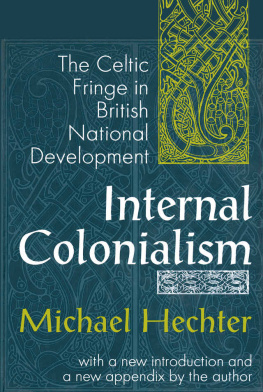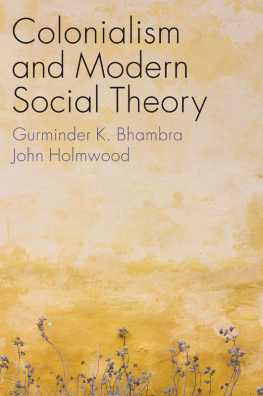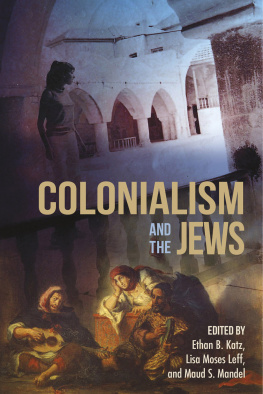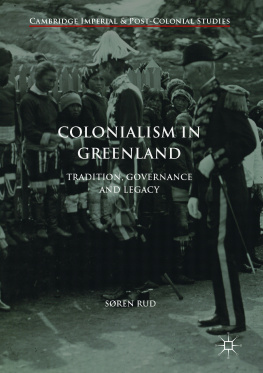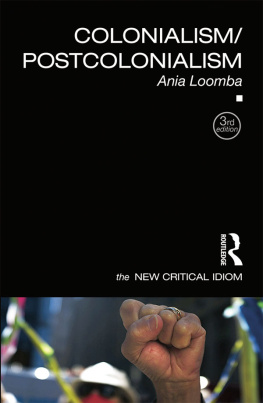Michael Hechter - Internal Colonialism
Here you can read online Michael Hechter - Internal Colonialism full text of the book (entire story) in english for free. Download pdf and epub, get meaning, cover and reviews about this ebook. year: 2017, publisher: Taylor and Francis, genre: Politics. Description of the work, (preface) as well as reviews are available. Best literature library LitArk.com created for fans of good reading and offers a wide selection of genres:
Romance novel
Science fiction
Adventure
Detective
Science
History
Home and family
Prose
Art
Politics
Computer
Non-fiction
Religion
Business
Children
Humor
Choose a favorite category and find really read worthwhile books. Enjoy immersion in the world of imagination, feel the emotions of the characters or learn something new for yourself, make an fascinating discovery.
- Book:Internal Colonialism
- Author:
- Publisher:Taylor and Francis
- Genre:
- Year:2017
- Rating:3 / 5
- Favourites:Add to favourites
- Your mark:
- 60
- 1
- 2
- 3
- 4
- 5
Internal Colonialism: summary, description and annotation
We offer to read an annotation, description, summary or preface (depends on what the author of the book "Internal Colonialism" wrote himself). If you haven't found the necessary information about the book — write in the comments, we will try to find it.
Internal Colonialism — read online for free the complete book (whole text) full work
Below is the text of the book, divided by pages. System saving the place of the last page read, allows you to conveniently read the book "Internal Colonialism" online for free, without having to search again every time where you left off. Put a bookmark, and you can go to the page where you finished reading at any time.
Font size:
Interval:
Bookmark:
Internal Colonialism
The Celtic Fringe in British National Development
Michael Hechter
with a new introduction and a new appendix by the author

Originally published in 1975 by University of California Press
Published 1999 by Transaction Publishers
Published 2017 by Routledge
2 Park Square, Milton Park, Abingdon, Oxon OX14 4RN
711 Third Avenue, New York, NY 10017, USA
Routledge is an imprint of the Taylor & Francis Group, an informa business
New material this edition copyright 1999 by Taylor & Francis.
All rights reserved. No part of this book may be reprinted or reproduced or utilised in any form or by any electronic, mechanical, or other means, now known or hereafter invented, including photocopying and recording, or in any information storage or retrieval system, without permission in writing from the publishers.
Notice:
Product or corporate names may be trademarks or registered trademarks, and are used only for identification and explanation without intent to infringe.
Library of Congress Catalog Number: 98-21989
Library of Congress Cataloging-in-Publication Data
Hechter, Michael.
Internal colonialism: the Celtic fringe in British national develop
ment / Michael Hechter; with a new introduction and appendix by
the author.
p. cm.
Includes bibliographical references and index.
ISBN: 978-0-7658-0475-4
1. CeltsGreat BritainPolitics and government. 2. CeltsGreat
BritainSocial conditions. 3. Great BritainEthnic relations.
4. Civilization, Celtic. 5. EthnicityScotland. 6. Ethnicity
Ireland. 7. EthnicityWales. I. Title.
DA125.C4H43 1998
305.891'6041dc21 98-21989
CIP
ISBN 13: 978-0-7658-0475-4 (pbk)
TO
GERTRUDE AND OSCAR HECHTER
- MAPS
- FIGURES
Does the Eagle know what is in the pit?
Or wilt thou go ask the Mole?
WILLIAM BLAKE

Great Britain and Ireland
THE research for this book began in 1968, while I was a graduate student at Columbia University. The year 1968 is an auspicious date in Columbia's history. During that year a massive student strike virtually closed down the university for much of the spring semester. The strike was directed against the university's imperial disposition toward the adjacent African-American community in Harlem, and its purported complicity in the Vietnam War. The element that united these otherwise disparate concerns was racism, both domestic and international. As one of the many sociology graduate students arrested in that strike, I was very much caught up in the temper of the times. It was difficult not to be. The Columbia strike was followed in swift succession by similar events at other major American university campuses, by massive student-worker strikes in Paris, and by the Soviet invasion that brought an abrupt end to the Prague spring. That summer, the Democratic Party convention in Chicago erupted in a melee. Political assassinations and inner city race riots were nearly becoming routine events. This was the high water mark for the generation gap; figures like Abbie Hoffman loomed large in the cultural landscape. To appreciate how much times have changed, rent a copy of the movie Hair at the local video store.
This book is very much a product of its time. It too is about the problem of integration, about the persistence of Irish, Scottish, and Welsh nationalism in the oldest industrial society. It takes issue with the prevailing view that efficient markets and industrialization will level all ethnic and racial differences and bring about cultural unity.
The concept of internal colonialism dates from the late nineteenth century and has two somewhat different connotations. Initially coined by Russian populists to describe the exploitation of peasants by urban classes, it was later adopted by Gramsci, Lenin, Preobrazhensky, and Bukharin to characterize the persisting economic underdevelopment of certain Russian and Italian regions. In this conception internal colonialism refers to a process of unequal exchange between the territories of a given state that occurs either as a result of the free play of market forces, or of economic policies of the central state that have intended or unintended distributional consequences for regions. Since the 1960s, however, the term has been largely reserved for regions that are simultaneously economically disadvantaged and culturally distinctive from the core regions of the host state.
Internal Colonialism has an unusual mix of ingredients. Although its title has a decidedly radical pedigree, the book was also one of the first historical studies in sociology to propose operational models and rely on multivariate statistical analysis to assess them. Its implicit message is that the best radical social thought has analytical rigor and deserves to be subjected to serious empirical tests. The idea that historical analysis should be carried out with the aid of theories and methods drawn from mainstream social science was controversial when this book first appeared. Ruth Dudley Edwards was one of the rare historians who deemed the enterprise worthwhile: "In a subject where emotionalism is too often employed, and where many of the historical arguments are well-worn, a scientific approach is welcome" ( Irish Independent , August 11, 1975). Most historians, however, reacted as did the editor of the British Studies Monitor (VI, 3, Summer 1976): "One has a strong suspicion that the conclusions were reached before the study started and that one is dealing with a case where historical data is manipulated to fit a pre-established sociological thesis.... Though the book has some novel things to say, historians can only be disappointed by it." If anything, the utility of social scientific approaches in history is probably more controversial now than it was then.
Fundamentally, the book proposes two separate arguments. The first is couched at the level of regions. This argument holds that the lack of sovereignty characteristic of internal colonies fostered a dependent kind of development which limited their economic welfare and threatened their cultural integrity: "Policies determining the administration of these territories were subsequently to be decided in a larger political arena, one in which the Celts were destined to play only a minor role. The peripheral population, therefore, lost the privilege of determining its own fate" (p. 119). The lack of sovereignty had different economic consequences in Ireland than in Scotland and Wales. In Ireland, it encouraged agricultural specialization; in Wales and Scotland, however, it promoted economic stagnation.
This claim that the absence of sovereignty had deleterious effects in the periphery was controversial, English reviewers gave little credence to the notion that the Celtic regions could be usefully compared to colonies:
We have all got used to being called colonialists but in this book the English are repeatedly accused of racism, both personal and institutionalized, towards the Scots, Welsh and Irish. The position of the latter in an English-dominated state is compared with the position of black Americans in a white-dominated state. It is said that one of the manifestations of this kind of racism is a definition of certain favoured roles and positions in such a way as to exclude people from the inferior cultures, and that another is the control of the economic system by the dominant race so as to ensure that the minorities are kept in a position of relative poverty. Now it is not obvious that the evidence entirely justifies this. In the present century Britain has had one Welsh and four Scottish Prime Ministers; Scotsmen seem to be at a relative advantage in the top-status professions; the recently-retired Governor of the Bank of England bears the name of O'Brien and the recently retired Head of the Diplomatic Service bears that of O'Neill. There may be English racism of the kind Mr. Hechter suggests but it is not immediately obvious and he does not produce any evidence to establish it.
Font size:
Interval:
Bookmark:
Similar books «Internal Colonialism»
Look at similar books to Internal Colonialism. We have selected literature similar in name and meaning in the hope of providing readers with more options to find new, interesting, not yet read works.
Discussion, reviews of the book Internal Colonialism and just readers' own opinions. Leave your comments, write what you think about the work, its meaning or the main characters. Specify what exactly you liked and what you didn't like, and why you think so.

